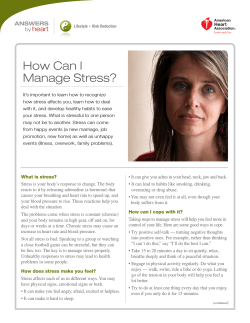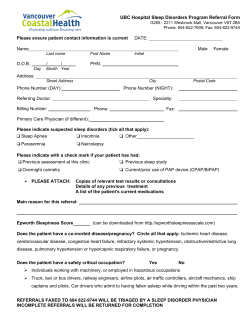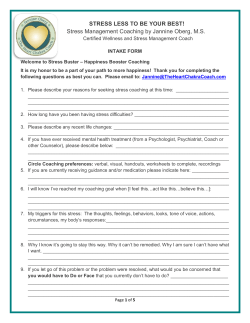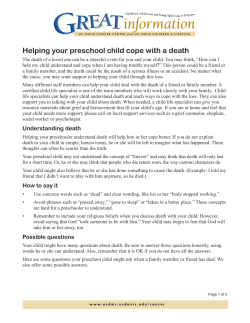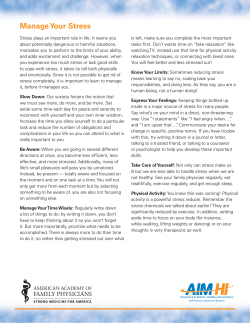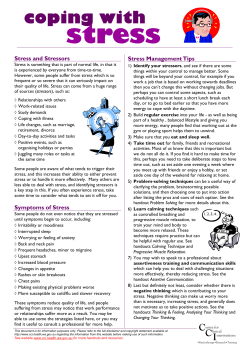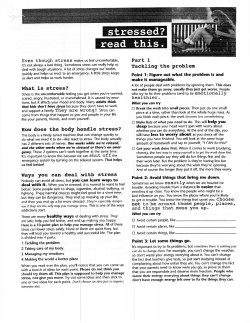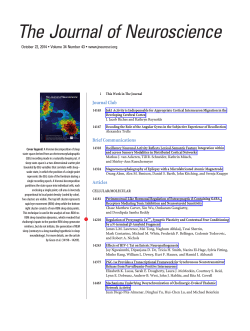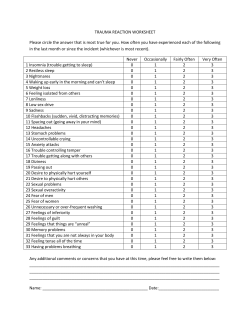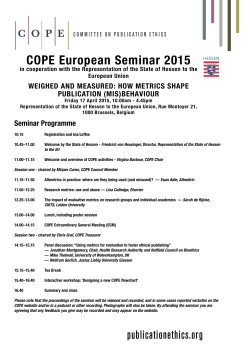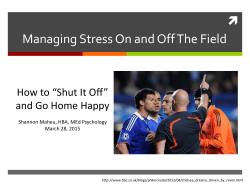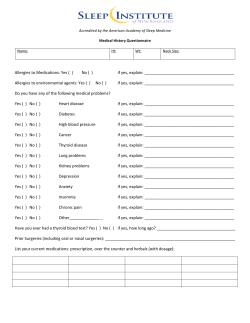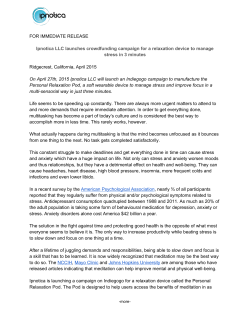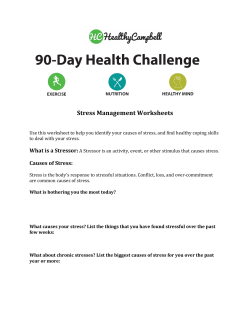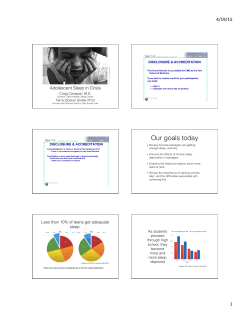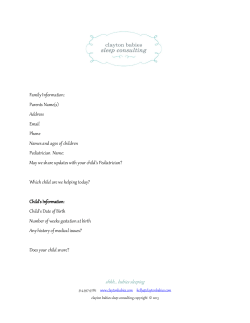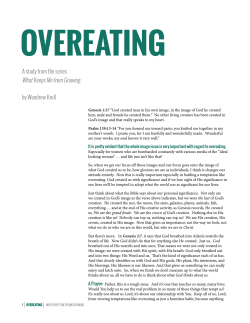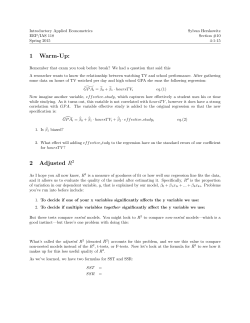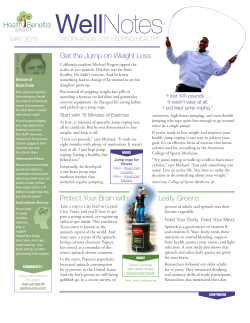
Click here to see the Document
Provided Courtesy of Nutrition411.com Stress Management Contributed by Shawna Gornick-Ilagan, MS, RD, CWPC Updated by Nutrition411.com staff Review Date 7/14 G-1104 Overview • Why managing stress is important • Consequences of not managing stress • Benefits of reducing stress • Barriers that prevent people from reducing stress • Strategies for managing stress What Is Stress? • Stress: The inability to cope with a threat to your wellbeing (real or imagined), which results in a series of responses and adaptations by your body • Stress can lead to poor health and even injury Types of Stress Stress Defined • Good stress: – Getting married – Moving to a new home – Starting a new job – Getting ready to perform in a sporting event/race Stress Defined (cont’d) • Bad stress: – Deadlines – Death of a loved one – Chronic illness – Family problems – Unresolved conflicts – Downsizing Stressors • Financial • Daily hassles • Environmental • Family related • Health related • Work related Signs and Symptoms Mental Physical Behavioral Nervousness Impatience Low self-image Depression Crying easily Frustration Headache GI distress Tight muscles High BP Sleeping issues Fatigue Overeating Substance abuse Lack of interest Irritability Blaming others BP=blood pressure, GI=gastrointestinal Why Worry About This? • Chronic stress is possibly the ultimate risk factor, causing: – 50% of all disease – Cancer – Heart disease • Stress has a dramatic effect on your immune system Why Worry About This? (cont’d) • Stress also is linked to a number of other conditions, including: – Accidents – Headaches – Digestive problems – Anxiety disorder – Depression – Sleeping problems – Heart problems – Lower resistance to infection Good News • You can make your life less stressful • Managing and reducing stress can protect you against the negative health consequences of stress • This also may improve your quality of life • Everyone can do something to decrease their stress Stress Management Coping Skills Healthy Coping Skills • Exercise • Downtime for self-care • Balance between work and play • Time management— initiate a schedule Unhealthy Coping Skills • Alcohol or drug use • Avoidance of event • Procrastination • Overeating Benefits of Stress Management • Keeps you calm when things go wrong • Helps you stay focused and positive • Improves the quality of sleep • Improves the immune function • Increases your energy level • Improves digestion • Prevents illnesses Barriers to Managing Stress • “I just ‘deal’ with my stress. It’s not a big issue.” • “It’s just stress. I don’t need counseling.” • “Stress is just a part of my job.” • “I don’t have time to deal with my stress.” • “I thrive on stress.” • “People who are stressed just can’t cope with reality.” Barriers to Managing Stress (cont’d) • “If I just make it through these next few weeks, I’ll be OK.” • “I’m so stressed, I don’t even know where to start.” • “Dealing with my stress would just be too expensive.” • “I’m always stressed. It hasn’t made a difference so far.” Making Stress Management a Priority • First, it is important to understand the process of how people change • When changing behaviors, such as those associated with reducing stress, most people go through a cycle known as the “Stages of Change ” Stages of Change Stage 1: “Nope, I’m not interested right now.” Stage 2: “Hmm, I am seriously considering stress management.” Stage 3: “Yep, I am getting ready to start dealing with stress.” Stage 4: “Let’s do it. I’m starting to find ways to manage my stress.” Stage 5: “It’s old news. I’ve coped with my stress for a long time.” What Stage Are You In? •Determining what stage you are in is an important first step in learning to manage stress •Once you know whether or not you are ready to change, you are better equipped to cope with whatever life throws at you 18 Key Point: Change Is A Process •Learning to manage stress is a process •Chances are you will find yourself in each stage at some point in the process 19 How to Manage Stress: WELLNESS Way of thinking Exercise Laughter Let it go! iNvolvement Eat a balanced diet Set priorities Sleep W=Way of Thinking • Attitude • Perception E=Exercise • Get moving • Why move L=Laughter • Did you know? • Power of humor L=Let It Go! All of It! • Desk stretches • Deep breathing • Guided relaxation N=iNvolvement With Others • Social support system • Friendships • Interaction E=Eat a Balanced Diet • Know that food is fuel • Visit ChooseMyPlate.gov • Make healthy eating a way of life S=Set Priorities • What is really important? • Personal reflection S=Sleep • How much is enough? • Tips for better sleep “OK, someone hand me my cigarettes, a cup of black coffee, and my Prozac®, and I will be fine…” How to Reduce Stress? Stress Reduction Kit Directions: 1. Place kit on firm surface. 2. Follow directions in circle. 3. Repeat step 2 as necessary or until unconscious. 4. If unconscious, cease stress reduction activity. Stress Management Strategies • Stress management is a decision-making process • When under stress, we can deal with it using three main methods • The ABCs of stress: – A=alter it, avoid it, and accept it – B=build your resistance – C=change your perception Stress Management Techniques • Relaxation techniques – Progressive muscle relaxation – Deep breathing – Guided imagery Any Questions?
© Copyright 2025
